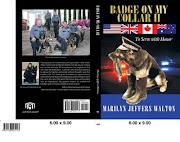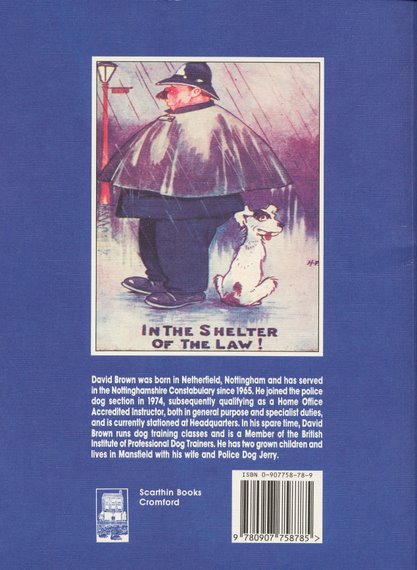Although my research indicates the use of a Police Dog by Nottingham City Police from 1910, I can find no mention of such use in a subsequent 'Standing Order' close to that time.
An extract, purely for interest, is as follows:-
NOTTINGHAM CITY POLICE STANDING ORDERS
Issued by
Lieut.-Col. FRANK BROOK, D…SO., M.C.
Chief Constable
Chief Constable’s
Office
Guildhall
Nottingham
1st
January, 1929.
STANDING ORDER No 1.
CONDITIONS OF SERVICE
Each constable will be enrolled for 2 years
on probation which may be extended for a period of six months.
During
to probationary period he will be required to attend Education, Police
Duty, First Aid, Drill and Physical Training, and Swimming and Life Saving
Classes provided, and to pass examinations therein.
A
constable on probation will be dismissed if he is not likely to become an
efficient officer.
He will devote his whole time to the
Police service of the City. He is not permitted to hold any other office or
employment or carry on any other trade or calling. He is not allowed, without
the Chief Constable’s permission, to reside at any place where is wife or any
member of his family carries on any business.
He will serve and reside where directed.
He is not permitted, without the consent of the Chief
Constable, to receive lodger or sub-let
a part of the house which he occupies, whether such house is provided by the
Police Authority or not.
He is to obey promptly all lawful orders
given by persons placed in authority over him, and to conform to all rules and
regulations of the Force made from time to time.
Single men desirous of marrying must first
obtain the sanction of the Chief Constable.
The pay of each rank is fixed by the scale
adopted for the Force. Two Special Advances and two Additional Increments are
obtainable by constables under conditions laid down in Police Regulations. In
accordance with the Police Pensions Act, 1921, a deduction of five per cent. Is
made from pay towards superannuation.
Rent, Boot, and other allowances are
granted according to regulations in force.
Police uniform and accouterments will be
supplied free and he will appear in such uniform at all times when on duty
unless otherwise directed.
The normal daily period of duty is eight
hours, performed in one tour with an interval for refreshment, but the period
of duty may be extended when necessary.
Every member of the Force is granted annual
leave of absence from duty according to the scale laid down, in addition to one
day in seven. Officers off duty must leave their addresses at their houses or
lodging when they go out of the City.
Qualifying Examinations must be passed
before officers will become eligible for promotion to the ranks of Sergeant and
Inspector.
The
services of a Police Surgeon are provided for members of the Force.
A
deduction is made from pay during sickness as follows:
Inspectors 2/- per day
Sergeants 1/6 per day
Constables 1/- per day
No
deduction is made when an officer is certified “Inured on duty”
He shall not resign or withdraw himself
from his duties unless allowed to do so in writing by the Chief Constable, or
unless he shall have given the Chief Constable one month’s previous notice in
writing. If he resigns or withdraws without leave or notice he is liable to
forfeit all pay due and to be charged before a Magistrate.
He will be liable to dismissal for unfitness, negligence or misconduct.
In the event of dismissal or resignation he shall forthwith
return every article of clothing and accouterments, and other necessaries
supplied to him for the execution of his duties. If such articles have been
improperly used or damaged he will be required to make good such damage.
He will not retain gratuities without permission
of the Chief Constable.
He
is not permitted to be a member of any Trade Union or Political Society. Any
member of the Force joining such society or union will cease automatically to
be a police officer.
Constables will be expected to take an active
part in the Athletic Club and the organisations connected with the Force
He
will be subject to the Police Regulations of 1920, made by the Secretary of
State and subsequent amendments thereto.






Great information.Thanks for sharing your information. Direct Cremation Preston
ReplyDelete